Abstract
Octreotide, a somatostatin analogue, has been shown to inhibit the growth of gastrointestinal cancers in vitro and in vivo. To assess the anti-tumour effect of octreotide, we performed a randomised trial comparing octreotide with best supportive care in advanced gastrointestinal cancer patients refractory to chemotherapy. A total of 107 patients with advanced gastrointestinal cancer refractory to chemotherapy were randomised to receive octreotide at the dose of 200 micrograms three times a day for 5 days a week, or the best supportive care only. The primary outcome variable was the survival duration. Response rate was an outcome variable of secondary importance. Fifty-five patients (15 stomach, 16 pancreas, 24 colon-rectum) received octreotide, while 52 (14 stomach, 16 pancreas, 22 colon-rectum) received the best supportive care. Patients treated with octreotide had a significant advantage in duration of survival with a median survival time of 20 weeks vs 11 in the control group (P < 0.0001). This advantage was present also considering the survival data for each tumour group. Twenty-five patients (45%) given octreotide showed stable disease vs only eight (15%) in the control group (P < 0.001). In conclusion, octreotide therapy seems to confer a survival benefit in advanced gastrointestinal cancer patients refractory to chemotherapy. Additional studies will be needed to confirm these results and to clarify other questions about dose and schedule of octreotide.
Full text
PDF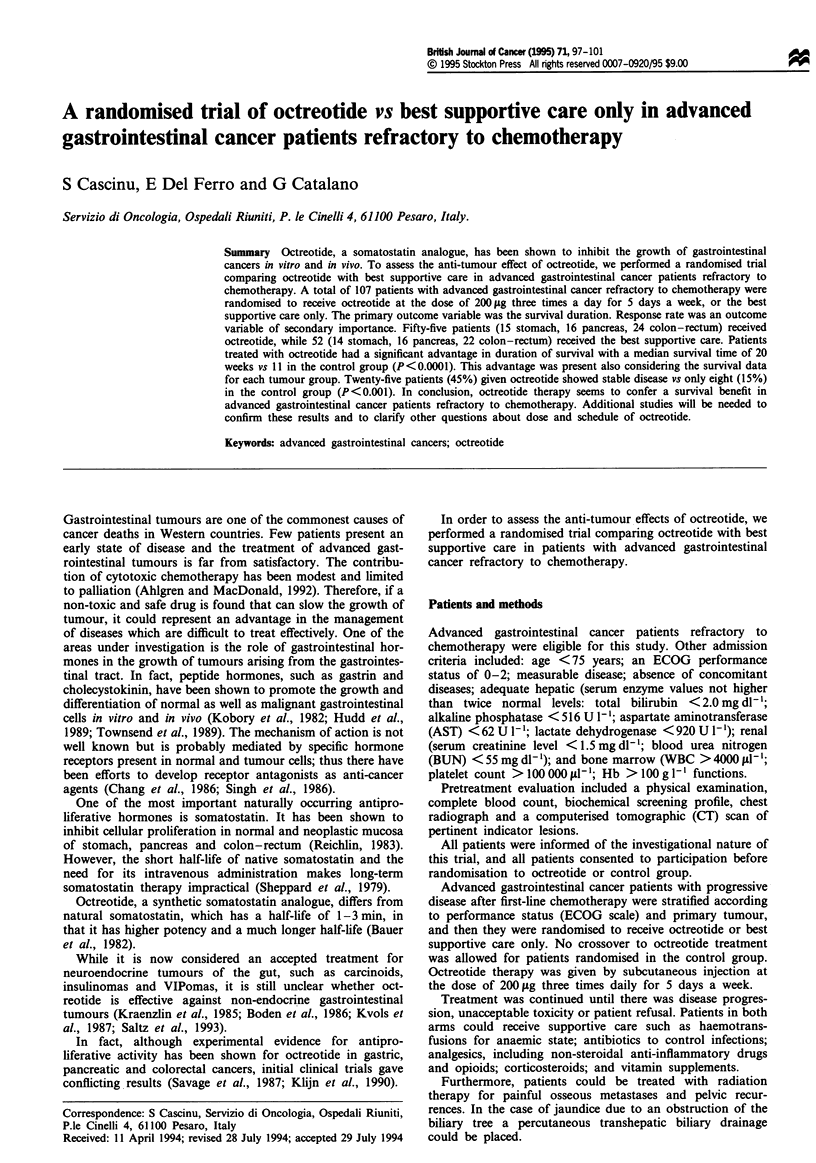
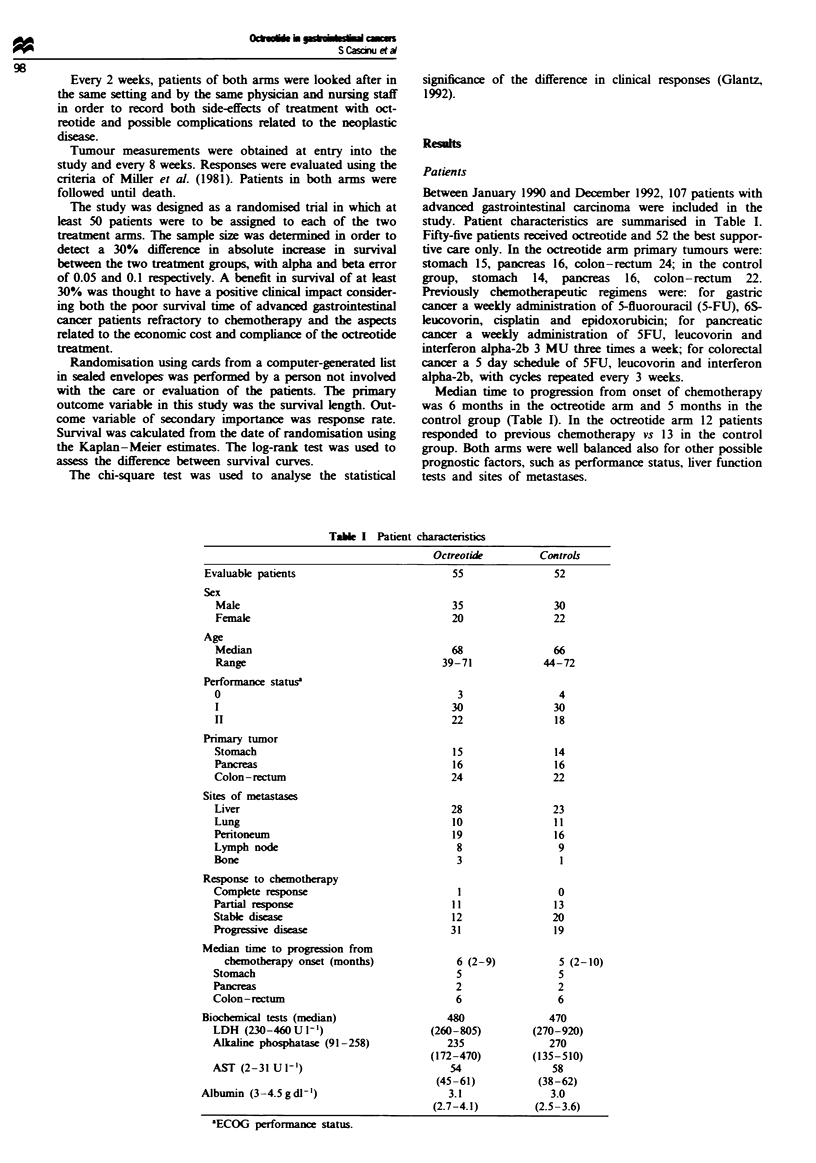
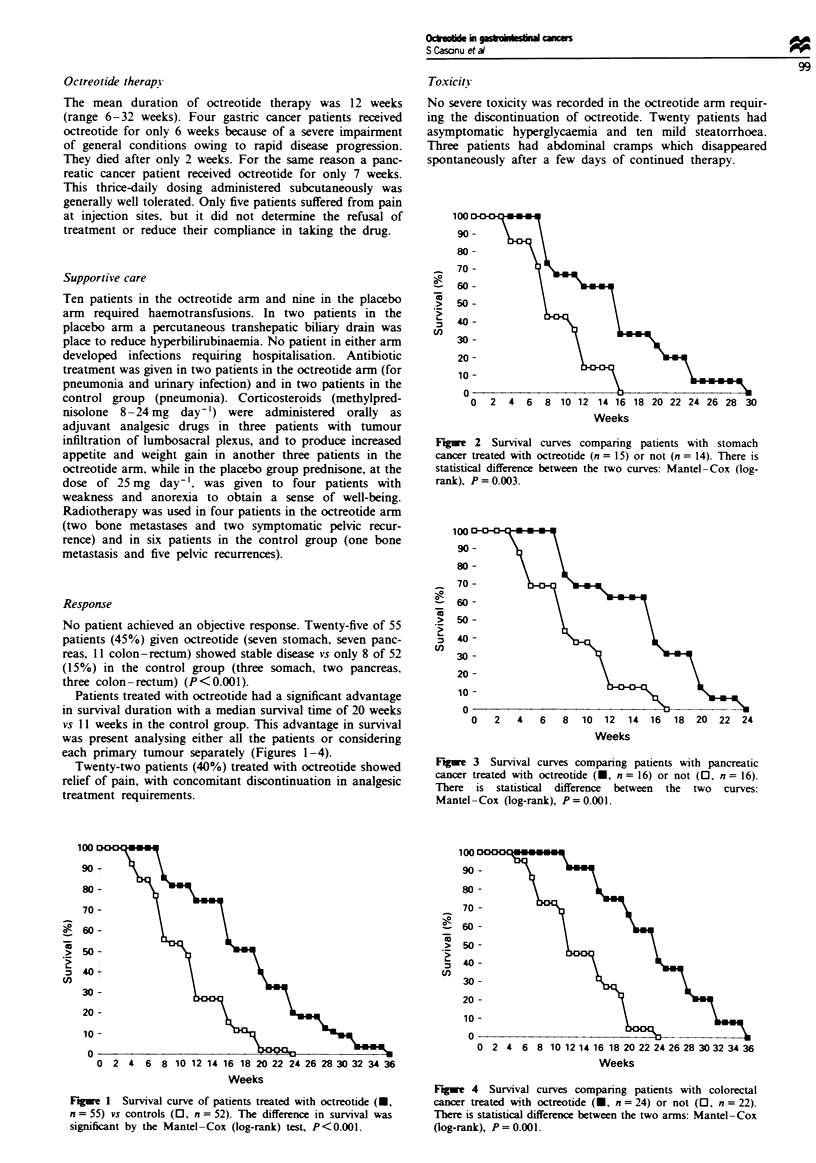
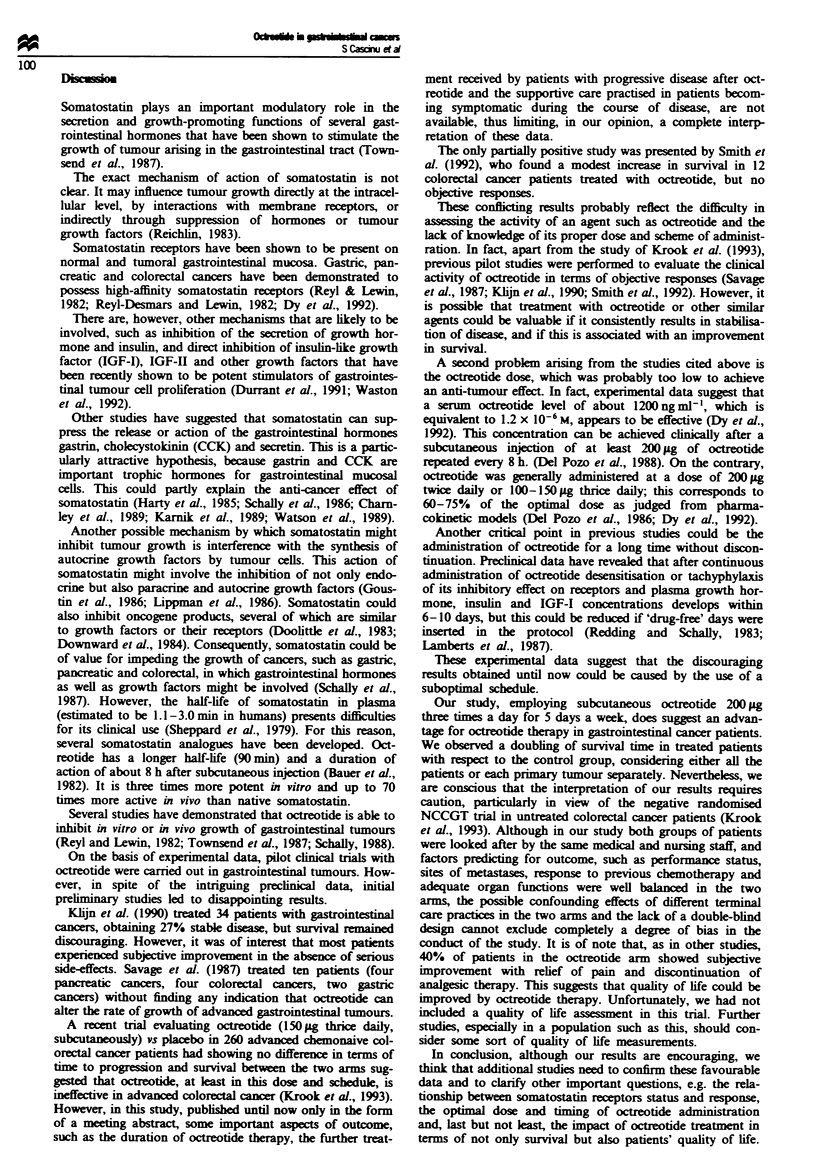
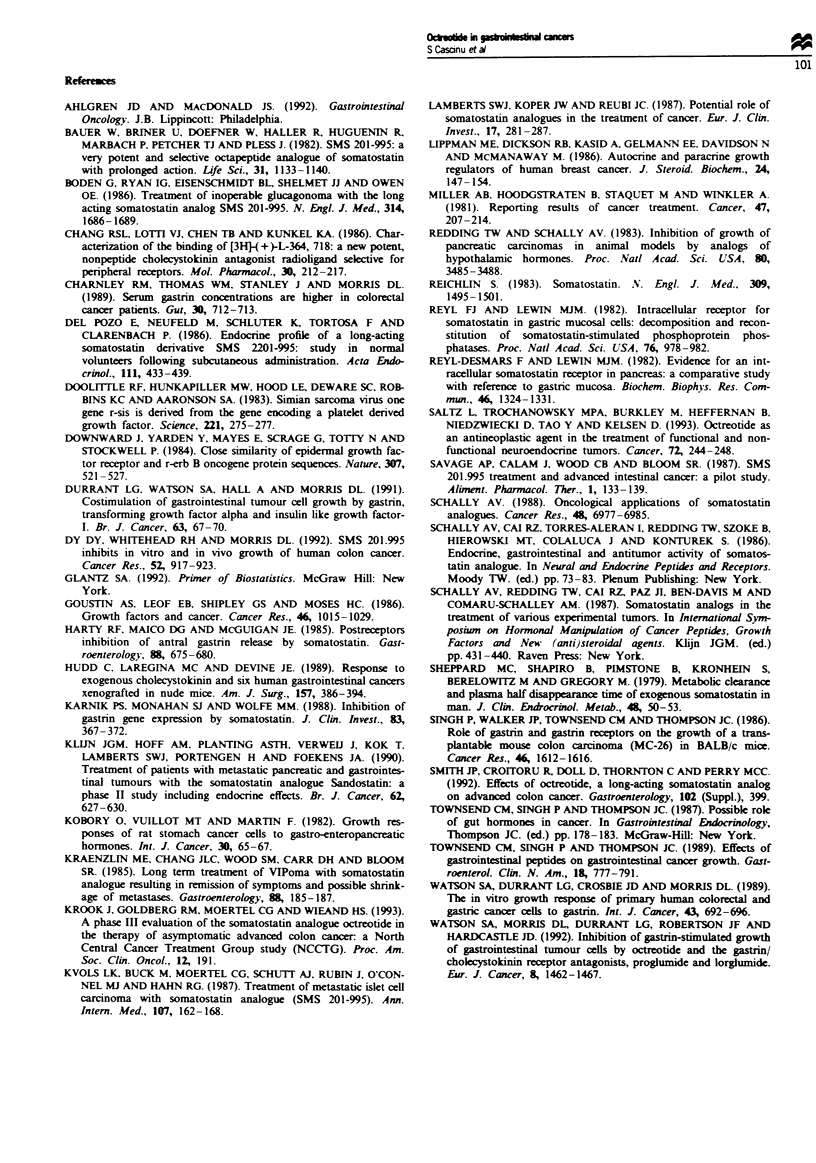
Selected References
These references are in PubMed. This may not be the complete list of references from this article.
- Bauer W., Briner U., Doepfner W., Haller R., Huguenin R., Marbach P., Petcher T. J., Pless SMS 201-995: a very potent and selective octapeptide analogue of somatostatin with prolonged action. Life Sci. 1982 Sep 13;31(11):1133–1140. doi: 10.1016/0024-3205(82)90087-x. [DOI] [PubMed] [Google Scholar]
- Boden G., Ryan I. G., Eisenschmid B. L., Shelmet J. J., Owen O. E. Treatment of inoperable glucagonoma with the long-acting somatostatin analogue SMS 201-995. N Engl J Med. 1986 Jun 26;314(26):1686–1689. doi: 10.1056/NEJM198606263142606. [DOI] [PubMed] [Google Scholar]
- Chang R. S., Lotti V. J., Chen T. B., Kunkel K. A. Characterization of the binding of [3H]-(+/-)-L-364,718: a new potent, nonpeptide cholecystokinin antagonist radioligand selective for peripheral receptors. Mol Pharmacol. 1986 Sep;30(3):212–217. [PubMed] [Google Scholar]
- Doolittle R. F., Hunkapiller M. W., Hood L. E., Devare S. G., Robbins K. C., Aaronson S. A., Antoniades H. N. Simian sarcoma virus onc gene, v-sis, is derived from the gene (or genes) encoding a platelet-derived growth factor. Science. 1983 Jul 15;221(4607):275–277. doi: 10.1126/science.6304883. [DOI] [PubMed] [Google Scholar]
- Downward J., Yarden Y., Mayes E., Scrace G., Totty N., Stockwell P., Ullrich A., Schlessinger J., Waterfield M. D. Close similarity of epidermal growth factor receptor and v-erb-B oncogene protein sequences. Nature. 1984 Feb 9;307(5951):521–527. doi: 10.1038/307521a0. [DOI] [PubMed] [Google Scholar]
- Durrant L. G., Watson S. A., Hall A., Morris D. L. Co-stimulation of gastrointestinal tumour cell growth by gastrin, transforming growth factor alpha and insulin like growth factor-I. Br J Cancer. 1991 Jan;63(1):67–70. doi: 10.1038/bjc.1991.14. [DOI] [PMC free article] [PubMed] [Google Scholar]
- Dy D. Y., Whitehead R. H., Morris D. L. SMS 201.995 inhibits in vitro and in vivo growth of human colon cancer. Cancer Res. 1992 Feb 15;52(4):917–923. [PubMed] [Google Scholar]
- Goustin A. S., Leof E. B., Shipley G. D., Moses H. L. Growth factors and cancer. Cancer Res. 1986 Mar;46(3):1015–1029. [PubMed] [Google Scholar]
- Harty R. F., Maico D. G., McGuigan J. E. Postreceptor inhibition of antral gastrin release by somatostatin. Gastroenterology. 1985 Mar;88(3):675–680. doi: 10.1016/0016-5085(85)90136-2. [DOI] [PubMed] [Google Scholar]
- Hudd C., LaRegina M. C., Devine J. E., Palmer D. C., Herbold D. R., Beinfeld M. C., Gelder F. B., Johnson F. E. Response to exogenous cholecystokinin of six human gastrointestinal cancers xenografted in nude mice. Am J Surg. 1989 Apr;157(4):386–394. doi: 10.1016/0002-9610(89)90582-5. [DOI] [PubMed] [Google Scholar]
- Karnik P. S., Monahan S. J., Wolfe M. M. Inhibition of gastrin gene expression by somatostatin. J Clin Invest. 1989 Feb;83(2):367–372. doi: 10.1172/JCI113893. [DOI] [PMC free article] [PubMed] [Google Scholar]
- Klijn J. G., Hoff A. M., Planting A. S., Verweij J., Kok T., Lamberts S. W., Portengen H., Foekens J. A. Treatment of patients with metastatic pancreatic and gastrointestinal tumours with the somatostatin analogue Sandostatin: a phase II study including endocrine effects. Br J Cancer. 1990 Oct;62(4):627–630. doi: 10.1038/bjc.1990.343. [DOI] [PMC free article] [PubMed] [Google Scholar]
- Kobori O., Vuillot M. T., Martin F. Growth responses of rat stomach cancer cells to gastro-entero-pancreatic hormones. Int J Cancer. 1982 Jul 15;30(1):65–67. doi: 10.1002/ijc.2910300112. [DOI] [PubMed] [Google Scholar]
- Kraenzlin M. E., Ch'ng J. L., Wood S. M., Carr D. H., Bloom S. R. Long-term treatment of a VIPoma with somatostatin analogue resulting in remission of symptoms and possible shrinkage of metastases. Gastroenterology. 1985 Jan;88(1 Pt 1):185–187. doi: 10.1016/s0016-5085(85)80153-0. [DOI] [PubMed] [Google Scholar]
- Kvols L. K., Buck M., Moertel C. G., Schutt A. J., Rubin J., O'Connell M. J., Hahn R. G. Treatment of metastatic islet cell carcinoma with a somatostatin analogue (SMS 201-995). Ann Intern Med. 1987 Aug;107(2):162–168. doi: 10.7326/0003-4819-107-2-162. [DOI] [PubMed] [Google Scholar]
- Lamberts S. W., Koper J. W., Reubi J. C. Potential role of somatostatin analogues in the treatment of cancer. Eur J Clin Invest. 1987 Aug;17(4):281–287. doi: 10.1111/j.1365-2362.1987.tb02188.x. [DOI] [PubMed] [Google Scholar]
- Lippman M. E., Dickson R. B., Kasid A., Gelmann E., Davidson N., McManaway M., Huff K., Bronzert D., Bates S., Swain S. Autocrine and paracrine growth regulation of human breast cancer. J Steroid Biochem. 1986 Jan;24(1):147–154. doi: 10.1016/0022-4731(86)90044-0. [DOI] [PubMed] [Google Scholar]
- Miller A. B., Hoogstraten B., Staquet M., Winkler A. Reporting results of cancer treatment. Cancer. 1981 Jan 1;47(1):207–214. doi: 10.1002/1097-0142(19810101)47:1<207::aid-cncr2820470134>3.0.co;2-6. [DOI] [PubMed] [Google Scholar]
- Reichlin S. Somatostatin. N Engl J Med. 1983 Dec 15;309(24):1495–1501. doi: 10.1056/NEJM198312153092406. [DOI] [PubMed] [Google Scholar]
- Reyl-Desmars F., Lewin M. J. Evidence for an intracellular somatostatin receptor in pancreas: a comparative study with reference to gastric mucosa. Biochem Biophys Res Commun. 1982 Dec 31;109(4):1324–1331. doi: 10.1016/0006-291x(82)91922-2. [DOI] [PubMed] [Google Scholar]
- Reyl F. J., Lewin M. J. Intracellular receptor for somatostatin in gastric mucosal cells: decomposition and reconstitution of somatostatin-stimulated phosphoprotein phosphatases. Proc Natl Acad Sci U S A. 1982 Feb;79(4):978–982. doi: 10.1073/pnas.79.4.978. [DOI] [PMC free article] [PubMed] [Google Scholar]
- Saltz L., Trochanowski B., Buckley M., Heffernan B., Niedzwiecki D., Tao Y., Kelsen D. Octreotide as an antineoplastic agent in the treatment of functional and nonfunctional neuroendocrine tumors. Cancer. 1993 Jul 1;72(1):244–248. doi: 10.1002/1097-0142(19930701)72:1<244::aid-cncr2820720143>3.0.co;2-q. [DOI] [PubMed] [Google Scholar]
- Savage A. P., Calam J., Wood C. B., Bloom S. R. SMS 201-995 treatment and advanced intestinal cancer: a pilot study. Aliment Pharmacol Ther. 1987 Apr;1(2):133–139. doi: 10.1111/j.1365-2036.1987.tb00612.x. [DOI] [PubMed] [Google Scholar]
- Schally A. V. Oncological applications of somatostatin analogues. Cancer Res. 1988 Dec 15;48(24 Pt 1):6977–6985. [PubMed] [Google Scholar]
- Sheppard M., Shapiro B., Pimstone B., Kronheim S., Berelowitz M., Gregory M. Metabolic clearance and plasma half-disappearance time of exogenous somatostatin in man. J Clin Endocrinol Metab. 1979 Jan;48(1):50–53. doi: 10.1210/jcem-48-1-50. [DOI] [PubMed] [Google Scholar]
- Singh P., Walker J. P., Townsend C. M., Jr, Thompson J. C. Role of gastrin and gastrin receptors on the growth of a transplantable mouse colon carcinoma (MC-26) in BALB/c mice. Cancer Res. 1986 Apr;46(4 Pt 1):1612–1616. [PubMed] [Google Scholar]
- Townsend C. M., Jr, Singh P., Thompson J. C. Effects of gastrointestinal peptides on gastrointestinal cancer growth. Gastroenterol Clin North Am. 1989 Dec;18(4):777–791. [PubMed] [Google Scholar]
- Watson S. A., Durrant L. G., Crosbie J. D., Morris D. L. The in vitro growth response of primary human colorectal and gastric cancer cells to gastrin. Int J Cancer. 1989 Apr 15;43(4):692–696. doi: 10.1002/ijc.2910430425. [DOI] [PubMed] [Google Scholar]
- Watson S. A., Morris D. L., Durrant L. G., Robertson J. F., Hardcastle J. D. Inhibition of gastrin-stimulated growth of gastrointestinal tumour cells by octreotide and the gastrin/cholecystokinin receptor antagonists, proglumide and lorglumide. Eur J Cancer. 1992;28A(8-9):1462–1467. doi: 10.1016/0959-8049(92)90544-c. [DOI] [PubMed] [Google Scholar]
- del Pozo E., Neufeld M., Schlüter K., Tortosa F., Clarenbach P., Bieder E., Wendel L., Nüesch E., Marbach P., Cramer H. Endocrine profile of a long-acting somatostatin derivative SMS 201-995. Study in normal volunteers following subcutaneous administration. Acta Endocrinol (Copenh) 1986 Apr;111(4):433–439. doi: 10.1530/acta.0.1110433. [DOI] [PubMed] [Google Scholar]


